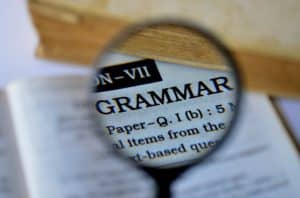Here are some of the most common IELTS writing myths that might be lowering your score:
- You score higher for using British spellings than American spellings.
- Your essay ideas must be interesting and original.
- You have to use real life examples, facts and figures.
- You need to write using lots of long words.
- You need to use lots of different tenses to score highly.
- Writing more words will get you a higher score.
- If you do more past papers you will automatically get a higher band score.
Here’s a video I made about myths about IELTS writing right here:
Let’s take a look at those IELTS writing myths in more detail now:
I can still remember the look on the student’s face as I explained to her that although she had written more words than her friend, it didn’t mean that her essay was better than her friends.
She had written 350 words and her friend had written 260. She had mistakenly thought that writing more meant that you got a higher mark and therefore she had focused on writing as much as she could, rather than focusing on the quality of her grammar and punctuation. And this inevitably meant her band score, in that essay, was much lower than her friends.
That is how myths can be dangerous and I want to share with you some more dangerous myths that might be stopping you from doing well in the IELTS test. And ‘yes’, I have heard students say all of these things,so pay close attention and make sure you don’t make any of these mistakes either.

The first myth is that you need to use British Spellings. This is simply not the case, although British teachers might encourage you to use British Spellings. It’s not going to damage your band score at all if you use the American version of the words. Spelling color, C-O-L-O-R is absolutely fine, you don’t have to spell it the British way C-O-L-O-U-R.
Myth number 2: your ideas must be interesting. Again this is simply not true. The examiner is looking at the quality of your English not the quality of your ideas. You don’t have to impress them with your intellectual thoughts or try to make them laugh. You just have to choose a simple idea and develop that well with good English. If you want to know what bandscore you are at right now and how to improve your IELTS writing then check this article out.
Myth number 3: you have to use real examples and facts and figures. Absolutely not, in fact it’s a really good tip to actually make up your examples and make up your facts and figures. Yes you want to make them sound realistic, but the examiner is not going to be going and checking your examples or your facts and figures.
They are only interested in if you’ve explained them well. So using it facts and figures and examples is a really good way to develop your paragraphs. I would recommend in fact that you do make up your examples and facts and figures to develop your paragraphs.
Myth number 4: you need to write using lots of long words. Again this is not true. You need to write using words in the way that they’re meant to be used. We call it ‘collocation’. When words ‘naturally fit together’, it’s natural to say ‘public transport’ or ‘greenhouse gases’ or ‘CO2 emissions’.
All those words fit together naturally they’re not necessarily long words, but it’s the way we use them and that is what you need to focus on in your writing as well. You don’t just need to go and use a lot of high-level academic words it won’t sound natural and could even lower your band score.
Myth number 5: you need to use as many tenses as possible. Again this is simply not the case. You’re not going to score highly if you write using 12 different tenses in your essay. Imagine if you did that, your essay would sound very strange indeed so it’s simply not what you need to  do.
do.
Many IELTS essays involve giving your opinion and generally that’s done in present simple. That’s the tense you need to use. You need to choose the tense which is relevant to what you’re writing and that’s it. You don’t need to go using tenses that that do not fit the situation.
Myth number 6: if I write more, then I will get a higher score. Absolutely not; you only have to write 250 words. You’re not going to score more if you write 350 words.
When you come to the last 5 or 10 minutes of the test you should spend that time checking your essay for grammar and punctuation to ensure the quality of your essay, rather than writing an extra paragraph to try and impress the examiners more.
Always remember its quality over quantity. Quality is more important. And finally:
Myth number 7: if I do more past papers, I will get better. Well the way to get better at IELTS is:
- To improve your exam technique, so you know how to do the test more efficiently and…
- To improve your general level of English.
Simply doing more and more past papers is not really going to help you. You may improve your exam technique, but you can only improve your exam technique so much. It’s not going to keep getting better and better. Once you know how to do the test, you know how to do the test.
There’s no point repeating more and more past papers. What you should then do is try to improve your general level of English. When you improve your general level of English you have a wider range of vocabulary. You’re able to use different sentence structures with control and accuracy, then that improves your general level of English which will enable you to do better in the tests.
There are 7 myths that I have personally heard students say, that have definitely been reducing their band score. Hopefully you’re now going to take those ideas forward and not make any of those errors in your test, or in your test preparation.
Finally, if you want to write really good essays then I suggest that you read my full guides on how to do IELTS writing here.



